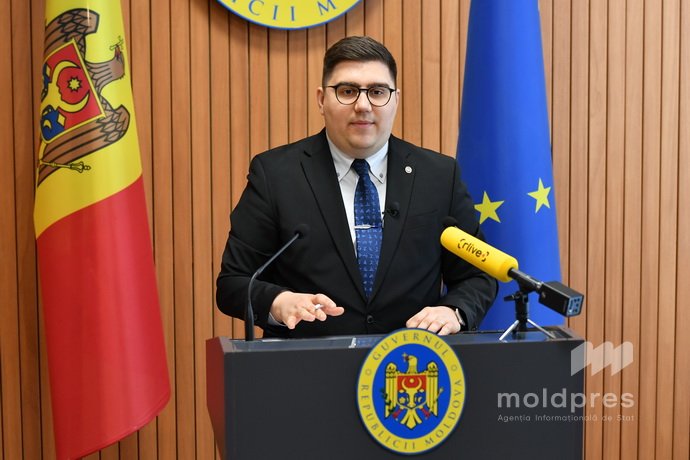
Spokesman for government describes concert held nearby exhibition dedicated to deportation victims as insult to Moldova's collective memory
The government describes the organization of a concert nearby the exhibition titled, State Terror in Soviet Moldova: Scale, Facts, Victims, and Perpetrators, as ‘’an insult to our collective memory.’’ The spokesman for the government, Daniel Voda, has expressed a position to this effect.
‘’The central authorities consider the organization of this concert near the Train of Pain exhibition as an insult to our collective memory,’’ said Daniel Voda, following a today’s cabinet meeting.
The government’s spokesperson noted that the Chisinau City Hall, as a local authority, needed to explain why it had allowed this concert to take place nearby another event organized by the government, namely the Train of Pain exhibition.
‘’The government condemns this mockery and considers it irresponsible,’’ the official stressed.
Referring to entry bans in Moldova, Daniel Voda said that ‘’those who undertake actions contrary to our country’s interests will not be able to enter Moldova.’’
‘’The government bans access to the country only based on the law. So, we're talking about the access to the country of people entering on different purposes, not just for artistic reasons. The fact that an artist is not on a sanctions list does not mean the state encourages such presence on its territory. On the contrary, we have condemned the use of art as a propaganda tool, a trend we have observed in recent times, especially in the case of artists coming from the Russian Federation, an aggressor state continuing the brutal war against Ukraine, which Chisinau has vehemently condemned,’’ said the government’s spokesperson.
Daniel Voda also said that ‘’even in the case of artists who make statements that contradict our country’s interests, there will be prompt decisions on behalf of the authorities.’’
‘’Other artists did not even manage to arrive because, from the outset, the authorities said that they would not allow their access on the territory of Moldova, because we do not support people who acted in the spirit of war and the promotion of military aggression against the neighboring country, Ukraine,’’ he noted.
At the same time, Daniel Voda encouraged citizens to visit the open-air exhibition, State Terror in Soviet Moldova: Scale, Facts, Victims, and Perpetrators, organized on the National Great Assembly Square.
‘’An exhibition dedicated to the hundreds of thousands of Moldovans who suffered as a result of deportations and Soviet terror deserves to be on the National Great Assembly Square, and the government will continue this effort of broad popularization and information, and on this occasion, we invite the entire society, all good-faith people to come visit the exhibition, to post information on social networks, to consult the national archives and to remember what happened in the history of our country. When everyone sees, no one will forget. This is the cabinet’s message on this subject,’’ Daniel Voda also said.
The exhibition, now at its third edition, includes two railway carriages similar to those in which people were deported to Siberia and will run until July 27. In one of the carriages, documents, photographs, books and diverse objects showing the experience of all those repressed by the Soviet regime are presented; in the second railway carriage, visitors can watch an exhibition dedicated to the 1946-1947 famine and more multimedia content. Additionally, visitors can view a virtual exhibition via VR technology.
During 1940-1953, the Soviet regime initiated a policy of terror against the population of Bessarabia. In just 13 years, about 80,000 people were forced to leave their homes, this being a well-organized operation, planned at the central level, with the aim of eliminating cultural elites, intimidating the population and destroying national identity.
The mass deportation from July 6-9, 1949, was the largest on the current territory of Moldova. The operation involved 11,281 families, with the forcibly displaced contingent in cattle wagons comprising 35,796 people, including 11,889 children, 14,033 women and 9,864 men.
Discussions on amendments to Law on legal practice held at Moldovan government
Number of Romany children receiving merit scholarships double in Moldova in last two years
Moldovan Justice Ministry initiates discussions with representatives of legal profession, competent authorities
Free spaces provided to children at parents’ workplace in Moldova
PHOTO // Over 150 million lei invested in local infrastructure of Moldova through European Village 2 national programme in last June
Moldova's Ministry of Defense denies misinformation about ''deceased Moldovan soldiers'' in Ukraine
Commission for prosecutors' evaluation hears entire leadership of Moldova's Anti-Corruption Prosecutor's Office
PHOTO // Moldovan firefighters, rescuers leave for Greece to help fight wildfires
Students from Moldova win one silver, three bronze medals at International Chemistry Olympiad
Moldovan cabinet adjusts public communication on electoral period
VIDEO // Moldovan government explains who decides, on what basis certain people are denied entry to Moldova
Spokesman for Moldovan government says cabinet invests, continues working for citizens, while some people bustle
EU sanctions for individuals, companies of Moldova // Spokesman for government says Moldovan leadership acts alongside Brussels to defend elections, democratic institutions
Moldovan deputy PM meets diplomats in Brussels
Model schools' network expands in Moldova, to include 90 institutions, with investments of 220 million euros
DOC // Moldovans working in Switzerland to be able to receive pensions, social guarantees
Spokesman for government describes concert held nearby exhibition dedicated to deportation victims as insult to Moldova's collective memory
Moldovan deputy PM meets Diaspora in Belgium
VIDEO // Codrii Nature Reserve promoted through new video spot by EcoContact association of Moldova
Moldovan PM has talks with Romanian investments minister
Moldova to participate in European projects for creation of jobs, support for vulnerable groups
EU Foreign Affairs Council meeting: Romania's foreign affairs minister expresses support for advancement of Moldova's, Ukraine's accession to EU
Chisinau International Airport to be renamed: to bear name of great departed composer Eugen Doga
Over 375,000 people from Transnistrian region have Moldovan citizenship
PHOTO GALLERY // Moldova, Romania signs joint Declaration to strengthen cooperation in European programmes


